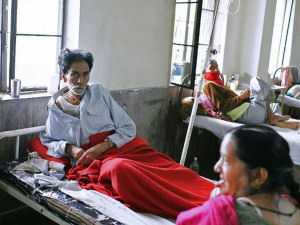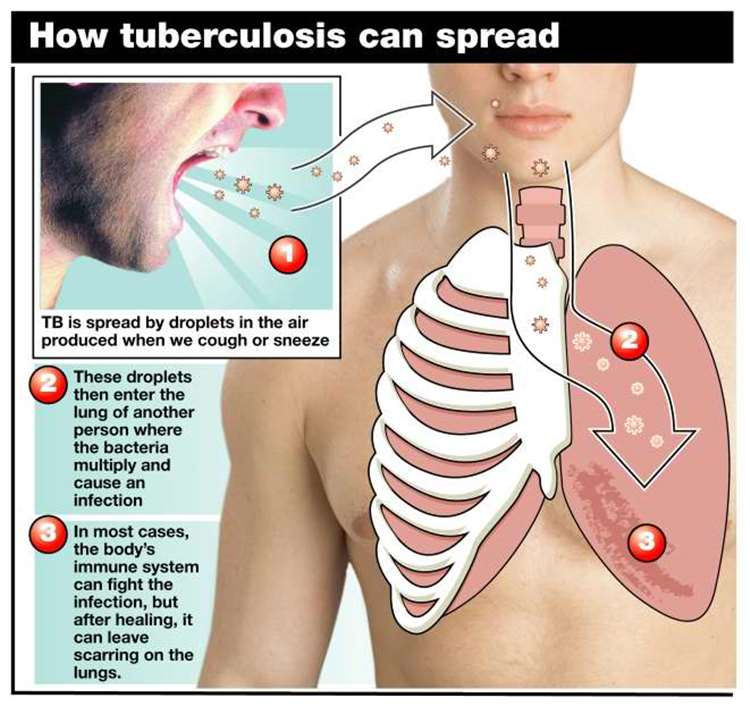|
 Influenza Influenza
Influenza, also known as the flu, is a very contagious
disease that is caused by the influenza virus. It attacks
the respiratory tract in humans and is different from
a cold. Influenza usually comes on suddenly and may
include the following symptoms:-
|
Fever
Cough
Sore throat
Nasal congestion
|
Headache
Body aches
Tiredness
Muscle weakness
|
These
are known as the classic "flu-like" symptoms
and are not unlike the symptoms of other illnesses such
as malaria. Indeed many people have mistaken the onset
of malaria for a bout of flu and have not taken appropriate
action with sometimes serious consequences.
Flu
is most common during the winter season, which
in the southern hemisphere is summer in the northern
hemisphere and visa-versa. It can occur year round in
the tropics. Although Influenza is a familiar illness,
and is often fairly mild in many healthy adults it is
however, a serious and sometimes fatal illness among
frail and elderly persons. Vaccination should be considered
for those at risk.
 Influenza
viruses are spread is from person to person by "droplet
spread". This happens when droplets from a cough
or sneeze of an infected person are propelled through
the air. The viruse also can be spread when a person
touches respiratory droplets on another person (e.g.
by shaking hands) and that person then touches their
own mouth or nose (or someone else’s mouth or nose)
before washing their hands. Influenza
viruses are spread is from person to person by "droplet
spread". This happens when droplets from a cough
or sneeze of an infected person are propelled through
the air. The viruse also can be spread when a person
touches respiratory droplets on another person (e.g.
by shaking hands) and that person then touches their
own mouth or nose (or someone else’s mouth or nose)
before washing their hands.
A person can start spreading the flu virus one day before
he or she feels sick and can continue to pass the flu
virus to others for another three to seven days after
the symptoms start. Symptoms start one to four days
after the virus enters the body.
 Some persons can be infected with the flu virus but
have no symptoms but they can still spread the virus
to others.
The disease can spread more easily amongst large groups
of people living in relatively close proximity to each
other e.g. cruise ships.
Some persons can be infected with the flu virus but
have no symptoms but they can still spread the virus
to others.
The disease can spread more easily amongst large groups
of people living in relatively close proximity to each
other e.g. cruise ships.
Treatment: Influenza is caused by a virus,
so antibiotics don't work to cure it. The best way to
prevent the flu is to get an influenza vaccine each
autumn, before the flu season. If you do happen to get
it, then the following treatment should be undertaken:-
 Diphtheria
Diphtheria
Respiratory diphtheria is a bacterial
infection that causes a moderately sore throat with
a greyish membrane over the infected area (usually membranes
of the tonsils, pharynx, or nose) with low grade fever.
In severe cases the neck tissue may become very swollen.
It
is passed from person to person by droplet transmission,
usually by breathing in diphtheria bacteria after an
infected person has coughed, sneezed or even laughed.
It can also be spread by handling used tissues or by
drinking from a glass used by an infected person.
In
tropical countries the infection may occur as skin ulcers
and is known as cutaneous diphtheria which presents
as infected skin lesions which lack a characteristic
appearance.
 After
two to six weeks, the effects of toxins produced by
the bacteria become apparent with severe muscle weakness,
mainly affecting the muscles of the head and neck. Inflammation
of the heart muscle may cause heart failure. Myocarditis,
polyneuritis, and airway obstruction are common complications
of respiratory diphtheria; death occurs in 5%-10% of
respiratory cases. After
two to six weeks, the effects of toxins produced by
the bacteria become apparent with severe muscle weakness,
mainly affecting the muscles of the head and neck. Inflammation
of the heart muscle may cause heart failure. Myocarditis,
polyneuritis, and airway obstruction are common complications
of respiratory diphtheria; death occurs in 5%-10% of
respiratory cases.
Transmission
is usually by direct person to person contact. Avoid
very close contact with infected people particularly
kissing and sharing bottles or glasses. It spreads quickly
amongst infected people in crowded places. Cutaneous
lesions are also important in transmission.
Diphtheria
remains endemic in developing countries and the countries
of the former Soviet Union have reported an epidemic
which began in 1990.
Treatment:
is specialised and requires medical supervision in hospital
where Diphtheria antitoxin is given as an intramuscular
or intravenous injection as soon as possible. The infection
is then treated with antibiotics, such as penicillin
or erythromycin.
Prevention:
There is a vaccine for diphtheria. Most people in the
UK receive their first dose as a child in the form of
a combined vaccine called DTP (diphtheria-tetanus-pertussis).
Immunisation: is very effective but protective immunity
is not present longer than 10 years after the last vaccination,
so it is important for adults at risk to get a booster
of tetanus-diptheria (Td) vaccine every 10 years.
 Legionnaires
Disease Legionnaires
Disease
Legionnaires'
disease, a form of pneumonia is a severe infection which
is caused by the bacterium Legionella Pneumophila. It
has been linked
to contaminated water used in water cooled air-conditioning
systems and sometimes showers. It
is believed to occur worldwide.
Legionella organisms can be found in many types of water
systems. However, the bacteria reproduce to high numbers
in warm, stagnant water such as that found in certain
plumbing systems and hot water tanks, cooling towers
and evaporative condensers of large air-conditioning
systems, and whirlpool spas.
 Outbreaks
of legionellosis have occurred after persons have breathed
mists that come from a water source (e.g., air conditioning
cooling towers, whirlpool spas, showers) contaminated
with Legionella bacteria. Persons may be exposed to
these mists in hotels, hospitals, or public places. Outbreaks
of legionellosis have occurred after persons have breathed
mists that come from a water source (e.g., air conditioning
cooling towers, whirlpool spas, showers) contaminated
with Legionella bacteria. Persons may be exposed to
these mists in hotels, hospitals, or public places.
Legionaires' is not passed from person to person, and
there is no evidence of persons becoming infected from
auto air conditioners or household window air-conditioning
units.
People of any age may get Legionnaires' disease, but
the illness most often affects middle-aged and older
persons, particularly those who smoke cigarettes or
have chronic lung disease. The time between the patient's
exposure to the bacterium and the onset of illness for
Legionnaires' disease is 2 to 10 days.
There is a significant mortality rate particularly among
the elderly.
Patients with Legionnaires' disease usually have fever,
chills, and a cough, which may be dry or may produce
sputum. Some patients also have muscle aches, headache,
tiredness, loss of appetite, and, occasionally, diarrhoea.
Erythromycin is the antibiotic currently recommended
for treating persons with Legionnaires' disease. In
severe cases, a second drug, rifampicin, may be used
in addition. Other drugs are available for patients
unable to tolerate erythromycin.
 Tuberculosis Tuberculosis
Pulmonary tuberculosis is
a contagious bacterial infection caused by Mycobacterium
tuberculosis (TB). The lungs are primarily involved
causing persistent cough with fever and sweating, but
the infection can spread to other organs. The disease
is slow to establish itself and general malaise, weakness
and weight loss are characteristic during this incubation
which may be up to twelve weeks. The disease is characterised
by the development of granulomas (granular tumours)
in the infected tissues.
 TB
is much more common in some parts of the world than
in the UK. The risk to travellers is limited since transmission
of the disease usually requires prolonged close contact.
Sometimes the disease can be overwhelming; producing
meningitis and coma; this particularly dangerous form
is usually found in children and those who have not
previously been vaccinated or exposed to the disease.
Recently, antibiotic-resistant strains of tuberculosis
have appeared. TB
is much more common in some parts of the world than
in the UK. The risk to travellers is limited since transmission
of the disease usually requires prolonged close contact.
Sometimes the disease can be overwhelming; producing
meningitis and coma; this particularly dangerous form
is usually found in children and those who have not
previously been vaccinated or exposed to the disease.
Recently, antibiotic-resistant strains of tuberculosis
have appeared.
Tuberculosis
can develop after inhaling droplets sprayed into the
air from a cough or sneeze from an infected person and
it can also spread through infected sputum and there
is a form spread through milk from infected cows. The
risk of contracting TB increases with the frequency
of contact with people who have the disease, and with
crowded or unsanitary living conditions and poor nutrition.
 Pulmonary
TB develops in the minority of people whose immune systems
do not successfully contain the primary infection. The
disease may occur within weeks after the primary infection,
or it may lie dormant for years before causing disease.
The extent of the disease can vary from minimal to massive
involvement, but without effective therapy, the disease
becomes progressive. Pulmonary
TB develops in the minority of people whose immune systems
do not successfully contain the primary infection. The
disease may occur within weeks after the primary infection,
or it may lie dormant for years before causing disease.
The extent of the disease can vary from minimal to massive
involvement, but without effective therapy, the disease
becomes progressive.
Infants,
the elderly, and individuals who are immunocompromised,
those undergoing transplant surgery who are taking anti
rejection medications are at higher risk for progression
of the disease or reactivation of dormant disease. Those
who have not received BCG immunisation are advised to
do so and if for travel purposes, at least six weeks
before departure to ensure a protective level of immunity.
 Treatment
with anti microbial drugs is effective but is prolonged
and requires medical supervision. It is also expensive
and not always available abroad. Incomplete treatment
of TB infections (such as failure to take medications
for the prescribed length of time) can contribute to
the emergence of drug-resistant strains of bacteria. Treatment
with anti microbial drugs is effective but is prolonged
and requires medical supervision. It is also expensive
and not always available abroad. Incomplete treatment
of TB infections (such as failure to take medications
for the prescribed length of time) can contribute to
the emergence of drug-resistant strains of bacteria.
Prevention:
Avoid overcrowded places in endemic areas, particularly
where spitting is common. Never drink unpasteurised
milk. If in doubt, boil it before drinking.
There is a vaccination (BCG) which can give a valuable
degree of protection, particularly in children. Travellers
who plan to spend more than a month in an area with
a high tuberculosis rate and who have not been previously
immunised should consider immunisation with BCG.

 SARS
SARS
(Severe Acute Respiratory Syndrome)
is a severe pneumonia
that has been reported in China Hong Kong, Vietnam,
Singapore, Taiwan, Indonesia, the Philippines, Thailand
and Canada. It appears to have spread in a short period
of time and is now regarded by the World Health Organisation
as a worldwide threat.
Travellers to areas where SARS has been reported should
be aware of the symptoms and seek immediate medical
advice should they develop any symptoms within ten days
of returning from an infected region.

Since April 2nd (2003) the Department of Health has
strongly advised against travel to Hong Kong and Guangdong
Province in southern China where the disease appears
to have its origins. More recently they have added Beijing
and Shanxi Province in China and Toronto in Canada.
Travellers are also advised to ensure that they have
adequate insurance to cover medical care and unplanned
extensions to their stay.
Cases in the UK are most likely to occur in people returning
from an affected area, especially one where transmission
is thought to be  continuing
such as Hong Kong or Guangdong Province. Recent data
suggests that transmission has slowed or stopped in
certain areas i.e. Canada, Singapore, Vietnam and Taiwan
but caution is still advised. continuing
such as Hong Kong or Guangdong Province. Recent data
suggests that transmission has slowed or stopped in
certain areas i.e. Canada, Singapore, Vietnam and Taiwan
but caution is still advised.
The infection is thought to be passed on by close contact
with an infected person, aerosol infection if it occurs
is rare. The initial signs are a flu like illness developing
within ten days of contact. Symptoms include rapid onset
of high fever followed by headache, muscle aches and
respiratory symptoms including cough, sore throat, shortness
of breath and difficulty breathing. There have been
numerous fatalities.
 The
organism responsible for SARS was originally thought
to be a paramyxo virus similar to the viruses responsible
for causing measles and mumps but It has now been identified
as a member of the coronavirus family never previously
seen in humans. Identification of the coronavirus means
that scientists can now move towards developing treatments
for SARS and successfully controlling the disease. At
present there is no specific treatment. The
organism responsible for SARS was originally thought
to be a paramyxo virus similar to the viruses responsible
for causing measles and mumps but It has now been identified
as a member of the coronavirus family never previously
seen in humans. Identification of the coronavirus means
that scientists can now move towards developing treatments
for SARS and successfully controlling the disease. At
present there is no specific treatment.
Outbreaks
such as the one in Toronto which affected family members
and health care workers are thought to have occurred
early in the epidemic when the significance of the condition
was not appreciated. Where infection control measures
are applied, outbreaks seem not to occur. Therefore,
anyone thought to be suffering from the illness should
be isolated and nursed using barrier techniques. Secondary
infections can be controlled with antibiotics and symptomatic
treatment undertaken.
 Avian
Influenza
(Bird Flu) Avian
Influenza
(Bird Flu)
Type A influenza viruses can infect several
animal species, including birds, pigs & horses.
Birds are an especially important species because all
known subtypes of the virus circulate among wild birds,
which are considered the natural hosts for influenza
A viruses and when they infect birds they are known
as "avian influenza viruses." Avian influenza
viruses do not usually directly infect humans or circulate
among humans.
Avian
influenza usually does not make wild birds sick, but
can make domesticated birds very sick and kill them.
They do not usually infect humans; however, several
instances of human infections and outbreaks have been
reported since 1997. When such infections occur, public
health authorities monitor the situation closely because
of concerns about the potential for more widespread
infection in the human population.
 The
reported symptoms of avian influenza in humans have
ranged from typical influenza-like symptoms (e.g., fever,
cough, sore throat and muscle aches) to eye infections,
pneumonia, acute respiratory distress, viral pneumonia,
and other severe and life-threatening complications. The
reported symptoms of avian influenza in humans have
ranged from typical influenza-like symptoms (e.g., fever,
cough, sore throat and muscle aches) to eye infections,
pneumonia, acute respiratory distress, viral pneumonia,
and other severe and life-threatening complications.
Currently
there is no definitive evidence of human-to-human transmission
of avian influenza and no infections have been documented
among health-care workers. While it is unusual for people
to get influenza infections directly from animals, such
transmission has been documented several times in recent
years and is under investigation although most human
cases have been linked to direct contact with diseased
birds.
 The
World Health Organisation and other health authorities
worldwide are seriously concerned over the co-circulation
of human and highly pathogenic animal influenza viruses
since an exchange of genes between the two viruses might
occur if individuals were co-infected with both viruses
which could give rise to a new virus to which humans
would have little or no immunity and which could be
transmitted from person to person. The
World Health Organisation and other health authorities
worldwide are seriously concerned over the co-circulation
of human and highly pathogenic animal influenza viruses
since an exchange of genes between the two viruses might
occur if individuals were co-infected with both viruses
which could give rise to a new virus to which humans
would have little or no immunity and which could be
transmitted from person to person.
It
is recommended that travellers to countries experiencing
outbreaks of avian influenza in poultry should avoid
areas with live poultry, such as live animal markets
and poultry farms. Large amounts of the virus are known
to be excreted in the droppings from infected birds.
Be sure to include a thermometer and alcohol-based hand
sanitiser for hand hygiene in your travel health kit.
Covid-19
 Coronavirus
disease (COVID-19) is an infectious disease caused by
the SARS-CoV-2 virus. Coronavirus
disease (COVID-19) is an infectious disease caused by
the SARS-CoV-2 virus.
Most
people infected with the virus will experience mild
to moderate respiratory illness and recover without
requiring special treatment. However, some will become
seriously ill and require medical attention.
Older people and those with underlying medical conditions
like cardiovascular disease, diabetes, chronic respiratory
disease, or cancer are more likely to develop serious
illness. Anyone can get sick with COVID-19 and become
seriously ill or die at any age.
The
best way to prevent and slow down transmission is to
be well informed about the disease and how the virus
spreads. Protect yourself and others from infection
by washing your hands or using an alcohol-based rub
frequently. Most people should now have been vaccinated
against Covid. However the vaccine does not prevent
further infection or transmission of the virus.
It is currently unclear whether wearing a face mask
provides protection from the virus since there is new
evidence that wearing a mask does not afford protection
because the virus particles can easily pass through
the mask.
The virus can spread from an infected person’s
mouth or nose in small liquid particles when they cough,
sneeze, speak, sing or breathe. These particles range
from larger respiratory droplets to smaller aerosols.
It is important to practice respiratory etiquette, for
example by coughing into a flexed elbow, and to stay
home and self-isolate until you recover if you feel
unwell.
 The
risks of getting COVID-19 are higher in crowded and
inadequately ventilated spaces where infected people
spend long periods of time together in close proximity. The
risks of getting COVID-19 are higher in crowded and
inadequately ventilated spaces where infected people
spend long periods of time together in close proximity.
Outbreaks
have been reported in places where people have gather,
often in crowded indoor settings and where they talk
loudly, shout, breathe heavily or sing such as restaurants,
choir practices, fitness classes, nightclubs, offices
and places of worship.
Although most of the COVID-19 related travel restrictions
and entry requirements have been dropped, travellers
should continue to check the rules for their destination
and any transit countries on the Foreign Commonwealth
and Development Office (FCDO) travel advice pages and
subscribe to updates. There are currently no COVID-19
entry requirements for travel to the UK.
|